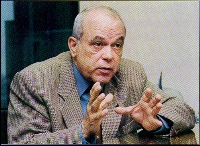Renato Cláudio Costa Pereira, new Secretary General, airs his views on ICAO's challenges in a rapidly changing world - and the importance of Rio Conference to the ultimate success of the most far-reaching aviation project ever undertaken.
After 100 days in office, what are your first impressions?
First, I believe we have an excellent Secretariat. I have met many people with very high professional skills, not only here at Headquarters but at regional offices as well. Second, I am convinced the organization is well equipped to face any challenge the world of aviation could put to ICAO now and in the future.
 What are some of the challenges you have identified thus far?
What are some of the challenges you have identified thus far?
In essence, they are practically the same as when ICAO was created in 1944: to build and maintain the framework for the safe and orderly development of civil aviation. Of course, the context has changed dramatically, primarily the incredible improvements in technology and the dramatic increase in traffic. Whatever the context, our mandate will always be to accompany the new technological developments and industry growth with standards and recommended practices that ensure harmonization and cooperation.
The safety record for 1996 and 1997 seems to indicate that we are not succeeding in further reducing the accident rate?
Yes, this is a major concern. Appropriate measures must be taken to further reduce the accident rate. To me, safety is the most important part of our mandate because there is nothing more precious than human life. We must do everything we can to help governments and the air transport industry to improve safety.
Of course, ICAO has undertaken a number of initiatives in this regard. We launched a programme, in close collaboration with industry, to prevent controlled flight into terrain, the most significant type of accident today. For years now, we have been working hard to raise awareness of human factors. Most recently, we have started a safety oversight programme, a very important undertaking.
There would be far fewer accidents if every country complied with all of the safety-related standards and recommended practices. And that is the goal of the ICAO safety oversight programme: to identify the problems and to assist in finding the right solutions. It may be lack of resources, expertise, or an administrative framework. Whatever the reason, we can correct the system by working together.
A global conference held at ICAO Headquarters last November focused on safety oversight. What do you see as its lasting impact on safety?

I was personally very proud that directors general of civil aviation from 148 countries agreed that the world needs a global safety oversight policy and that ICAO is the natural leader to turn the policy into reality. They said yes to mandatory assessments on a regular basis for all Contracting States. They said yes to expanding the current ICAO safety oversight programme, at the appropriate time, to all areas of civil aviation which have an impact on safety. They said yes to many other recommendations that will save lives. That is a great accomplishment. The nations of the world will all work together with ICAO in making a big difference in the quality of life for hundreds of millions of people who fly every year. To me, it is a milestone in the history of civil aviation.
In your statements to date, you stress that ICAO is an integral part of the air transport industry.
Absolutely! Air transport is fundamentally the basis for economic development in all parts of the world. In that context, ICAO and IATA are two faces of the same coin. ICAO represents governments, the people that have and will always have responsibility for safety and security. That is something they cannot delegate. And IATA represents the industry and liability. Both organizations exist to serve mankind and to help raise the standard of living of everyone on the planet.
What is your assessment of the strategic action plan(***) launched by ICAO just before your appointment?
From a conceptual point of view, the plan is fantastic. It clearly reaffirms our mission and sets permanent goals. My objective is to translate the plan into specific activities and tasks, assigning responsibilities and time frames. In other words, to produce a business plan with well established priorities. Our Contracting States operate on this basis and so should we. We are now revising the organization's budget based on real costs, and will roll that down throughout the organization in the coming months.
You want to bring a business approach to ICAO?

We have no choice. Like many Contracting States and the industry itself, we must do much more with much less. We need to improve our management capability. We are asked to be more efficient. I think this is natural; after all, we are working with other people's money.
I insist on this approach. We have the right people. We are building a solid business plan. We will meet the priorities of the Council and the Assembly. To do this, we have to plan in a realistic way and give them the options. They will decide. We will do what we are asked to do in the best way we can.
What do you see as being the role of ICAO's regional offices?
It's at the level of the State that a proper air transport system can be established and maintained. This is where it happens. So our regional offices must be ready to meet the needs of our Contracting States in eliminating the gaps between standards and recommended practices and existing facilities. Governments must not only be assessed when required but also helped in solving their problems as long as the problem is present. The local or regional approach is the only approach that can help us collectively meet our safety, security and efficiency goals. We have to be close to the field. In that sense, the regional offices have a dual purpose: to react quickly to the needs of the States and to provide to the Secretariat the required input so that we can make the necessary adjustments to carry out the plan in the most economical and effective manner.
In May, ICAO will hold the first-ever worldwide conference on CNS/ATM systems implementation in Rio de Janeiro. What is the purpose of the meeting?
In my opinion, the coherent and timely implementation of CNS/ATM systems is our best guarantee that international civil aviation can grow in a safe and orderly manner well into the 21st century. Generally speaking, the technology is there. What we want to do in Rio is to plan the next crucial steps in the implementation of CNS/ATM systems, namely the required financing mechanisms and the institutional and administrative framework.
The stakes are high. By allowing a more efficient use of airspace, CNS/ATM can increase airspace capacity, provide substantive economies in flight operations and further enhance the regularity of air transport. For the traveller, it can mean getting to destinations more quickly and with fewer problems. For the shipper of goods, it translates into better customer service, more efficient use of resources and potential savings.
The other compelling argument for CNS/ATM is the considerable contribution it can make to safety. That is a major part of ICAO's raison d' tre, to save lives and eliminate the devastating effects of accidents. In short, what we are creating is a machine that will improve the quality of life and promote business opportunities.
What concrete results are you expecting from the Rio Conference?
I am looking to establish a consensus on the course of action from all the contributors, including States, manufacturers, financial institutions and every other sector which has a role and a stake in turning the concept into reality. There must be no disagreements. This project is too important. I want strong, practical recommendations, not only from ministers and directors general of civil aviation but also from senior officials representing areas such as finance and planning _ all those responsible for the quality of life in the cities and regions of the world. We need to make recommendations that will make it possible to implement CNS/ATM in all regions in total harmony and coordination with all contributors.
What if we don't succeed?
It's impossible! We have a moral responsibility to make it happen. If we don't, we will be interrupting the proper development of air transport. If we strangle air transport, we will be choking the capability of the world to develop, to create better conditions of life for mankind. If we deny this to the world, it may lead to a period of stagnation detrimental to the global marketplace.
ICAO is a crucial player in this process. If we do not assume the leadership role expected of us, the rest of the world will go along without us. I am determined to make sure we succeed.
In summary, you view air transport as an engine for growth and generator of quality of life?
Yes, in my opinion, it is one of the best tools at our disposal for improving the standard of living around the world. Let me add this. With the outcome of the recent DGCA Conference in Montreal on a global safety oversight policy, we will begin the Rio Conference at a point that not even the Rio Summit of '92 on the environment could reach. They could only go as far as to consider the human being as the centre of attention in every aspect of development. But if you read the recommendations of the DGCA meeting, you realize that our ultimate focus is on the protection of human life. That is a great achievement.
Everything we can do during our lives, during the time we are productive, must be towards the improvement of the human being. If we are not doing that, we are wrong and we will pay a very high price in the end. It is the reason for everything in life.

*** ICAO's strategic action plan was formally launched in May 1997. The plan is the first comprehensive re-evaluation of ICAO's mission since the specialized UN agency was created through the Convention on International Civil Aviation in 1944. It repositions ICAO to deal more effectively with the constantly evolving challenges facing civil aviation, particularly in the area of flight safety. The strategic action plan focuses on eight major objectives to further the safety, security and efficiency of international civil aviation, and identifies 43 related key activities as the "core" programme of the organization.
The eight major objectives are to: (1) foster the implementation of ICAO standards and recommended practices to the greatest extent possible worldwide; (2) develop and adopt new or amended standards, recommended practices and associated documents in a timely manner to meet changing needs; (3) strengthen the legal framework governing international civil aviation by the development of new air law instruments as required and by encouraging the ratification by States of existing instruments; (4) ensure the currency, coordination and implementation of regional air navigation plans and provide the framework for the efficient implementation of new air navigation systems; (5) respond on a timely basis to major challenges to the safe and efficient development and operation of civil aviation; (6) ensure that guidance and information on the economic regulation of international air transport is current and effective; (7) assist in the mobilization of human, technical and financial resources for ci vil aviation facilities and services; and (8) ensure the greatest possible efficiency and effectiveness in the operations of the organization.
A complete text of ICAO's Strategic Action Plan in AdobeAcrobat format (PDF) is available here.
Originally published in "ICAO Journal", January/February 1998
